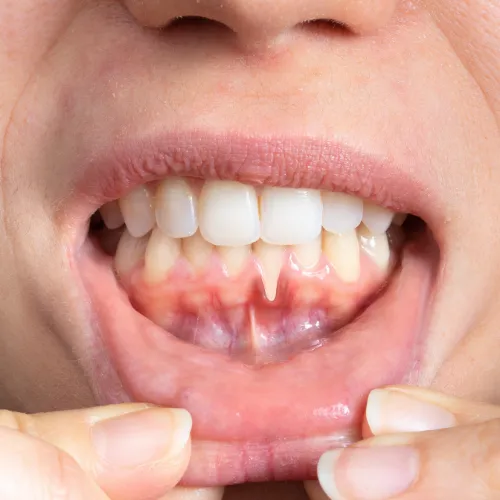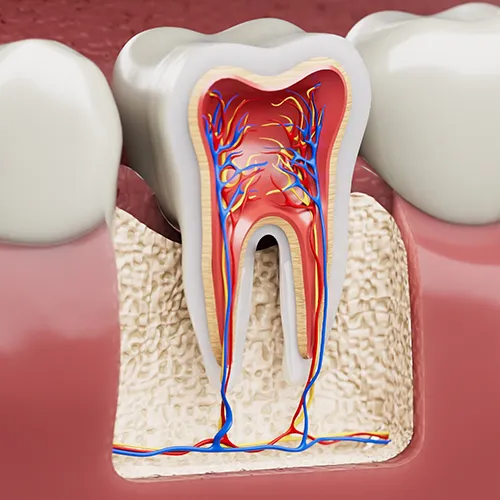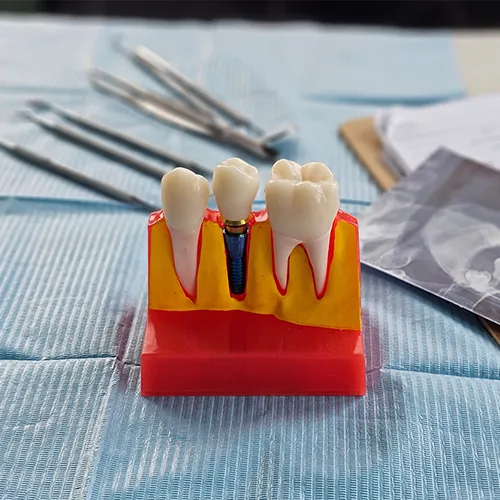Emergency Dentistry
That Throbbing Pain Might Be More Than Just a Toothache
There’s tooth pain, and then there’s the kind of pain that wakes you up at 2 AM, radiates through your jaw, and makes your entire head feel like it’s pulsing. If that sounds familiar, you might be dealing with a tooth abscess.
A tooth abscess isn’t something to brush off (pun intended). It’s a pocket of pus caused by a bacterial infection, often developing in the soft pulp of your tooth or the bone around it. Left untreated, it can spread to other areas of your body, damage surrounding teeth, and even lead to serious health complications.
Let’s break it down; what’s happening inside that tooth, and what should you do about it?
What causes a tooth abscess in the first place?
Most abscesses start with untreated tooth decay, deep cavities, or trauma to the tooth. When bacteria slip past your enamel and reach the inner pulp, they can infect the soft tissue, leading to swelling, pain, and eventually, a buildup of pus.
But not all abscesses are the same. Here’s a quick overview of the three main types:
- Periapical abscess: The most common type, forming at the tip of the tooth root.
- Periodontal abscess: Occurs in the gums next to the root, often due to gum disease.
- Gingival abscess: Stays within the gum tissue and doesn’t affect the tooth or ligament.
Each of these has slightly different symptoms and causes, but the common thread is infection and pain.
How do I know if I have a tooth abscess?
Here’s the thing: you’ll probably feel it. The pain is usually persistent and severe, and it doesn’t go away with home remedies. But symptoms can also include:
- A swollen cheek or jaw
- A bad taste in your mouth
- Sensitivity to hot and cold
- A fever
- Swollen lymph nodes
- Pain when biting or chewing
- A small bump or pimple on your gums that might leak pus
In some cases, the pain may subside on its own—only because the abscess has ruptured. That doesn’t mean it’s healed. You’ll still need professional treatment to remove the infection and prevent complications.
Can a tooth abscess heal on its own?
Short answer: no. Even if the pain temporarily fades, the infection is still active and can spread to your jaw, neck, or even your bloodstream.
Antibiotics can help reduce the infection, but they’re not a cure by themselves. To fully resolve an abscess, your dentist needs to remove the source—either by draining the abscess, performing a root canal, or, in severe cases, extracting the tooth.
That’s where endodontics comes in. As specialists in treating the pulp and root of the tooth, we’re trained to save teeth that would otherwise be lost to infection.
At Akemi Dental Specialists, we use precise diagnostics and imaging to find the extent of the abscess, then create a personalized treatment plan to restore your health—and your comfort.
How is a tooth abscess treated?
Treatment depends on the severity and location of the abscess, but common procedures include:
- Draining the abscess: Your dentist makes a small incision to release the pus and relieve pressure.
- Root canal treatment: We clean out the infected pulp, disinfect the root canals, and seal the tooth to prevent further infection.
- Tooth extraction: If the tooth can’t be saved, it may need to be removed to stop the spread.
- Antibiotics: Used to control the infection, especially if it has spread beyond the abscessed area.
- Pain management: Over-the-counter or prescribed medications can ease your discomfort while healing takes place.
You might also be advised to avoid very hot or cold foods, stick to soft meals, and gently rinse with warm salt water during recovery.
What happens if a tooth abscess is left untreated?
This is where things can take a dangerous turn. The infection from an abscess can extend into your jawbone, sinuses, or even vital organs through your bloodstream. Conditions like sepsis—your body’s extreme response to infection—are rare but serious.
Ignoring a tooth abscess can also damage surrounding teeth, cause facial swelling that interferes with breathing or swallowing, and lead to chronic oral health issues. The longer you wait, the more complex and costly treatment becomes.
Can I prevent a tooth abscess?
Absolutely—and prevention is far easier (and cheaper) than dealing with a full-blown infection. Most tooth abscesses start small, from issues like untreated cavities or gum irritation. But with the right care and habits, you can avoid the domino effect that leads to an abscess in the first place.
Here’s what makes the biggest difference:
- Brush twice a day and floss daily. It sounds simple, but keeping plaque and bacteria at bay is your first line of defense.
- Don’t ignore cavities—treat them early. A small cavity today can become a big problem tomorrow. Even if it doesn’t hurt yet, bacteria might already be making their way inside the tooth.
- Avoid using your teeth as tools. That means no chewing ice, opening bottles, or biting your nails. These habits can lead to small cracks that allow bacteria to sneak in.
- Wear a mouthguard if you grind your teeth or play contact sports. Grinding (especially at night) can wear down enamel and make your teeth more vulnerable to infection.
- Stay alert to signs of trouble. Pain, swelling, sensitivity to hot or cold, or even a bad taste in your mouth could mean something’s brewing beneath the surface. Don’t wait—get it checked out.
- Keep up with your dental checkups. Even if everything feels fine, your dentist can spot early signs of infection or damage that you might not notice. If you’ve had crowns, fillings, or implants, regular exams help ensure they’re still protecting your teeth the way they should.
Remember: your mouth doesn’t give you a ton of warning signs. A little maintenance now can spare you a lot of pain later.
When should I see a dentist?
If you’re experiencing pain that lingers, swelling that won’t go down, or any of the symptoms mentioned earlier, don’t wait it out.
An untreated abscess won’t just go away—it will get worse. The good news? With prompt, expert care, we can treat the issue, save your tooth, and get you back to smiling pain-free.
At Akemi Dental Specialists, your comfort and health come first.
We know dental pain can be overwhelming, but you don’t have to face it alone. Our experienced endodontists are here to walk you through the process, answer your questions, and deliver the care you need with precision and empathy.
Don’t wait for the pain to escalate, schedule your appointment today.























